F. W. Boreham Collection (9 vols.)
Digital Logos Edition
Overview
One of the most unrecognized writers within all of Christendom is the little known, but widely read and cited, Frank William Boreham. Despite being unknown to most people, he is still the best selling Australian author of all time. Frank Boreham wrote some 55 books and more than 3000 editorials. He was a master story teller and illustrated better than most Christian authors that God could be relevant in ways never before considered. The F. W. Boreham Collection (9 vols.) brings you a collection of essays and stories written by F. W. Boreham throughout his life.
With the Logos Bible Software edition of F. W. Boreham Collection (9 vols.), the reader has a plethora of resources that offer applicable and insightful material for their study. You can easily search the subjects F. W. Boreham writes about and use his illustrations and your personal findings to help you prepare material for sermons and study groups.

Key Features
- Contains an abundance of essays and stories from F. W. Boreham's experiences or perspectives
- Useful for putting together illustrations for sermons and teaching
Praise for the Print Edition
Throughout his life, F. W. Boreham wrote and refined his stories in order to master the difficult art of telling a story well. Such diligence was rewarded as Dr. Boreham became recognized as one of the leading Christian preachers and writers in the first half of the twentieth century. In the second half of the last century, well-known preachers such as Billy Graham, Ravi Zacharias (USA) and Gordon Moyes (Australia) have frequently expressed their indebtedness to Boreham's writings.
—Dr. Geoff Pound, Chair of Coordinating Committee, Theologians without Borders
Of the books that have played the greatest role in molding me, I count many volumes by especially one writer: F. W. Boreham. He authored more than fifty books of essays and pastored congregations in New Zealand, Tasmania, and Australia. He was not the classical preacher, not even a profound, deep preacher, but he was marvelous at seeing beauty in the simple things of life. He heeded John Wesley's charge to young preachers to blend simplicity with sublimity, 'the strongest sense in the plainest language.'
—Ravi Zacharias
Product Details
- Title: F. W. Boreham Collection (9 vols.)
- Author: F. W. Boreham
- Publisher: John Broadbanks
- Volumes: 9
- Pages: 1,074
Individual Titles
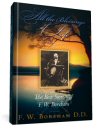
This volume contains more than 250 of the best stories found in F. W. Boreham's writings. While many readers of this new volume will be devoted followers of Boreham, others may be sampling him for the first time. For these such readers, the biographical essay by Irving Benson has been included as it provides an introduction and the setting for understanding the life and work of this storyteller.
Frank Boreham’s discovery of the power of stories was instilled within him when he was a child. Sunday night was story time in the Boreham household. Boreham knew that while the experience of being spellbound by stories is a good first step it did not make him into a scintillating storyteller. He therefore committed himself to developing the art of storytelling. Throughout his life Boreham wrote and refined his stories in order to master the difficult art of telling a story well. Such diligence was rewarded as Dr Boreham became recognized as one of the leading Christian preachers and writers in the first half of the twentieth century. In the second half of last century, well known preachers such as Billy Graham, Ravi Zacharias and Gordon Moyes have frequently expressed their indebtedness to the writings of F. W. Boreham. Scores of lesser-known speakers and writers have discovered Boreham and have scoured his books in search of an apt illustration for their sermons and articles.
Many of the stories in this volume come from human experience. Furthermore, F. W. Boreham had a rich fond of stories because he was an avid reader of books. A large number of F. W. Boreham’s stories in this book come from nature, either from first-hand experience, or his reading of nature books.
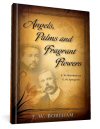
Angels, Palms and Fragrant Flowers: F. W. Boreham on C. H. Spurgeon
- Author: F. W. Boreham
- Publisher: John Broadbanks
- Publication Date: 2009
- Pages: xxiii, 69
F. W. Boreham writes, "A king-maker occupies a more exalted eminence than a king. And in that (Victorian) age of crisis and transformation there were many kingly spirits who gratefully confessed that, but for Mr. Spurgeon's ministry—in public or in private—their own contribution to the nations' development would have been negligible." The complete foreword, written by Boreham for a friend's book, and from which the preceding is an extract, opens this book which gives tribute to C. H. Spurgeon. There is a little redundancy in Boreham's three sermons, one lecture and an essay, but the portrait he paints of Spurgeon more than makes up for any repetition. A preface by Geoff Pound and two introductory essays about Spurgeon and his college by Steve Miller, a Harvest House editor, provides context for a book that is not only biographical but inspiring. Spurgeon's Christ-centered focus and passion for souls are invigorating.

A Packet of Surprises: The Best Essays and Sermons of F. W. Boreham
- Author: F. W. Boreham
- Publisher: John Broadbanks
- Publication Date: 2008
- Pages: xxvi, 298
Choosing the best essays of F. W. Boreham is as excruciating as selecting some children to get the honors and telling the others that they did not make the grade. The selection of the essays in this volume are subjective. But there is some rhyme and reason to the choices. Some were voted in by current Boreham readers so they appear by popular demand. Others are clearly Boreham's choice or were popular in his day. In compiling this selection an effort has been made to include essays on a range of themes, those which illustrate different homiletical methods and others that are drawn from different periods in Boreham's career. The sermon "The Whisper of God" may at face value have not made the cut in Boreham's best but it is included because it is the best of his earliest sermons and it illustrates how his preaching changed in style, structure, and length. The Best Essays and Sermons of F. W. Boreham demonstrates the way that Boreham worked hard to remodel his writing and preaching through such things as the removal of wordy clutter, for it is clear to see the emergence of a simple and flowing style. These essays and sermons have been brought together not for literary inspection and homiletical interest but so they might speak powerfully to readers in this contemporary age. The great hope for this new book is that it might stimulate among its readers one of the major themes of F. W. Boreham—that each person, with their God-given gifts might develop their unique style. This book also includes: a profile of Boreham written by T. Howard Crago, and name and topical indexes.
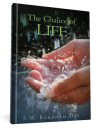
The Chalice of Life: Reflections on the Significant Stages of Life
- Author: F. W. Boreham
- Publisher: John Broadbanks
- Publication Date: 2008
- Pages: xii, 58
This book is a collection of five addresses that F. W. Boreham delivered on some major stages of life, and this is accompanied by two further essays in which the author develops the theme of life's milestones. Throughout these pages one feels the sheer exuberance that Boreham had for life. He possesses a sense of wonder about the newness of each day. His approach is to greet each day with expectancy and to make the momentous decisions with which life confronts us. F. W. Boreham claimed that the greatest day of a person s life was not their birthday, their wedding anniversary, or the date of their death but, the greatest day in a man's life is the day on which he finds himself overwhelmed and bowed to earth by a sense of the greatness of God.
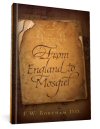
From England to Mosgiel
- Author: F. W. Boreham
- Publisher: John Broadbanks
- Publication Date: 2011
This rare book is one of F. W. Boreham’s earliest writings. It’s a series of five dispatches from Boreham to the editor of his hometown newspaper in England. He provides details of his journey by train and ship to the pastorate that awaited him in Mosgiel, New Zealand. Geoff Pound provides a fascinating preface that by itself makes this worth having.
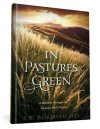
In Pastures Green: A Ramble through the Twenty-Third Psalm
- Author: F. W. Boreham
- Publisher: John Broadbanks
- Publication Date: 2011
- Pages: x, 40
This is such a masterful reflection on Psalm 23 that it's hard to believe that F. W. Boreham was 83 when he wrote it. It's Boreham at his best. The text sparkles with wit and wisdom. Though this will appeal to people of any age, it will especially be comforting to those who are in crisis or even facing death.
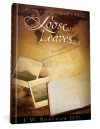
Loose Leaves: A Travel Journal
- Author: F. W. Boreham
- Publisher: John Broadbanks
- Publication Date: 2010
- Pages: 126
This book chronicles F. W. Boreham's pilgrimage to the birthplaces and homes of many great English and Scottish writers and his communion with them as the young writer recalls quotations and thoughts from their books. His pen romps over the pages as he writes about the topics which would become some of his lifelong themes history, literature, faith, heroism, royalty, and the charms in everyday life. Boreham's ability to paint a picture, tell a story, and uncover fascinating detail is evident on every page.
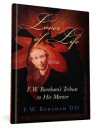
Lover of Life: F. W. Boreham's Tribute to His Mentor
- Author: F. W. Boreham
- Publisher: John Broadbanks
- Publication Date: 2009
- Pages: 44
Many of us have our heroes but we often fail to recognize the people who helped to shape them. In Lover of Life the distinguished author Dr. F. W. Boreham draws back the curtain to pay tribute to one of his mentors, Joseph John Doke. This is a tantalizing sketch of a pastor, artist, author, who later in South Africa became a friend and freedom fighter with Mahatma Gandhi in the struggle for the rights of minority races. Instead of a treatise on Effective Mentoring, F. W. Boreham in his inimitable way tells stories of how it worked for him and how pivotal such a relationship was in his own life and ministry. It would be good if seminary and denominational leaders put this book into the hands of every seminary student and pastor who are embarking on a new mentoring relationship. This short story about the friendship between J. J. Doke and Frank and Stella Boreham provides a wealth of insight and a hopeful vision of what a mentoring relationship might become.
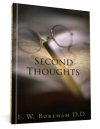
Second Thoughts
- Author: F. W. Boreham
- Publisher: John Broadbanks
- Publication Date: 2007
- Pages: xii, 68
Second Thoughts consists of five previously published essays that have been brought together for the first time: "Second-Hand Things," "The Second Crop," "Second Fiddles," "Our Second Wind" and "Second Thoughts." F. W. Boreham draws profound meaning from each of these "second" themes. This is a great introduction to the writings of F. W. Boreham. It starts with what he means to Ravi Zacharias. It also includes the outstanding essay, "The Second Crop." It uses a delightful story to illustrate an obscure biblical text about possessing your possessions. The idea is that our first crop comes with acquiring something. The second crop comes when one fully enters into it and learns how to use it. It's one thing to own a piano. It's quite another to actually learn how to play it. This essay alone makes the book worthwhile, but each one has its nuggets of truth that Boreham unearths in his typical warm manner.
This title is included in the following collections
You can save when you purchase this product as part of a collection.
Logos 6 Baptist Diamond Legacy...
$2,999.99$2,999.99Logos 5 Baptist Diamond Legacy...
$2,999.99$2,999.99
About William Frank Boreham
William Frank Boreham, (1871-1959), preacher and writer, was born on March 3, 1871 at Tunbridge Wells, Kent, England, eldest child of Francis Boreham, solicitor's clerk, and his wife Fanny Usher. He was educated and was later a pupil-teacher at Grosvenor United School, Tunbridge Wells. In December 1884 he became junior clerk with a local brickworks where, in a locomotive accident, he lost his right foot, necessitating the life-long use of a stick. Late in 1887 he went to work as a clerk in London, becoming increasingly involved in church, debating and writing activities. Although his family was Anglican, he was baptized at Stockwell Old Baptist Church in 1890; he preached from pavement and pulpit and published Won to Glory in 1891. He was admitted to Spurgeon's College, London, in August 1892, serving as a student-minister at Theydon Bois, Essex, where he met Estella Maud Mary Cottee. In 1894 Boreham was called to the Scottish community at Mosgiel near Dunedin in New Zealand, and was inducted on March 17, 1895. Stella, then 18, followed to marry him at Kaiapoi on April 13, 1896. Boreham became president of the Baptist Union of New Zealand in 1902, and published The Whisper of God and Other Sermons. He wrote editorials for the Otago Daily Times, contributed to theological journals and, as a keen temperance advocate, participated in liquor polls in 1905 and 1907. In June 1906 Boreham was called to the Baptist Tabernacle, Hobart. He edited the Southern Baptist and later the weekly Australian Baptist and in 1910 became president of the Tasmanian Baptist Union. His George Augustus Selwyn was published in 1911. He wrote a biographical series for the Hobart Mercury, which in 40 years covered 2000 persons; in 1912-59 he contributed 2500 editorials to the Mercury and the Melbourne Age. Boreham's 80 publications, including religious works, homiletic essays, and novels, sold over one million copies.
Reviews
4 ratings
Dr Jason Harris
2/24/2019
F.W. Boreham is amazing. If you ever see one of his books in print, buy it. It's that simple.Ray Brown
7/24/2017
David
1/31/2016
You really need to add "Bunches of Everlasting" to this. I had come across quite by accident a while back and then our 80-something year old pastor just mentioned it in his sermon this morning as one of his favourites. It's got 7 positive reviews on Amazon (one negative because of a faulty kindle version). That's amazing for a book of its age.
David Leslie Bond
11/20/2013